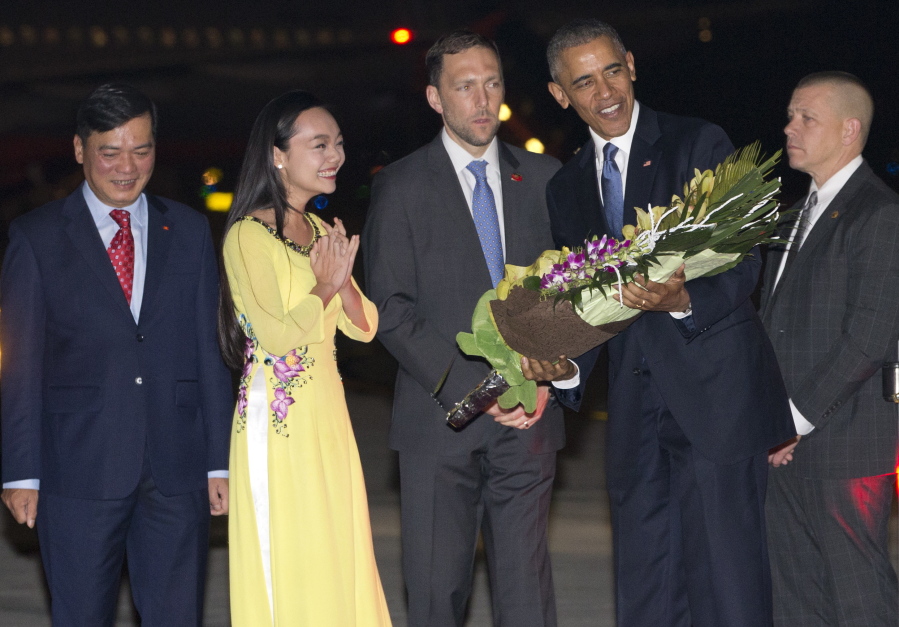HANOI, Vietnam — The biggest obstacle to President Barack Obama’s hope to improve relations with Vietnam on his visit, which began Sunday, will be the communist nation’s dismal record on human rights.
Some residents can’t practice their religion. Other activists aren’t allowed to run for political office. And an increasing number of bloggers face retribution for calling for more freedom and transparency. Human-rights groups say nearly 100 dissidents are imprisoned in Vietnam.
The country has what a group of U.S. senators calls one of the most repressive regimes in the world, after other nearby communist countries like China and North Korea.
Vietnam remains very much a closed country. All political power lies firmly with the ruling Communist Party, which carefully monitors public and private lives. There is no independent media, and civil society groups cannot legally register unless they submit to the Communist Party’s control, said Rafendi Djamin, director of Amnesty International’s South East Asia and Pacific Regional office.
That will force Obama into a delicate balancing act as he tries to boost economic and military ties to the former enemy while not appearing to accept Vietnam’s actions on human rights.
“Obama should stand next to Vietnam’s leaders in public and call on them to respect the right to freely choose government representatives, stand for office, and peacefully advocate for democracy,” said Brad Adams, Asia director of Human Rights Watch. “If this trip is partially about legacy-building, as some suggest, there can be no more meaningful legacy than helping the people of Vietnam achieve fundamental reforms.”
The president will get his first chance Monday when he meets with Vietnam’s president, Tran Dai Quang. Obama’s visit, the third by a sitting U.S. president since U.S. troops left the country in the 1970s, also will include a speech to the nation.
“Vietnam’s systematic human-rights abuses and the activity of pro-democracy dissidents are currently seen as inconvenient truths getting in the way of U.S.-Vietnam relations,” said Marion Smith, executive director of the Victims of Communism Memorial Foundation. “The United States must not sanction Vietnam’s corrupt and illegitimate government due to short term geopolitical calculations.”
Tuesday, Obama will meet with members of Vietnamese civil society, when he is sure to speak about human rights, said Ben Rhodes, president’s deputy national security adviser.
Before Obama left Washington, Vietnam released the prominent Catholic dissident Nguyen Van Ly, three months before an eight-year prison sentence was to end, a symbolic move on the eve of the presidential trip.
Still, Obama faces pressure from human-rights groups and lawmakers of both parties on Capitol Hill to push Vietnam to release all 100 prisoners, including Montagnard Christians –a persecuted ethnic minority — bloggers and dissidents.
That includes prominent Vietnamese human-rights lawyer, Nguyen Van Dai, who has been detained for five months without being able to see his lawyers and family. His wife, Vu Minh Khanh, told Congress last week that Dai was beaten and faces years in prison for allegedly violating a law that makes conducting propaganda against the state a crime. She called on Obama to push for his freedom.
In a letter Friday calling Vietnam one of the most repressive regimes in the world, five Republican senators including Marco Rubio of Florida and John Cornyn of Texas urged Obama to press its leaders to respect freedom of religion and expression.
Democrats, including Rep. Loretta Sanchez, D-Calif., a member of the Congressional Caucus on Vietnam whose district includes many Vietnamese Americans, agree.
Some also have urged Obama not to lift a four-decade ban on weapons, saying that would eliminate leverage the U.S. has used to push Vietnam to change its human-rights practices.
Sanchez offered an amendment to a defense bill last week that would encourage the White House to make any arms sales to Vietnam contingent on human-rights progress.
“If the United States lifts the arms embargo on Vietnam, we will be giving a free pass to a government that continually harasses, detains and imprisons its citizens who are fighting for their basic civil rights and freedoms,” she said.
Sen. John McCain, R-Ariz., who was a prisoner of war in Vietnam, said he hopes Obama will raise the issues on his trip, but that he thinks that there are other ways to push the country to act on human rights, including imposing sanctions and curtailing U.S. investment in the country. “There’s a number of ways we could put additional pressure on the Vietnamese,” he said.
The prospects appear mixed.
A 2015 report by the State Department said the country continued to enforce “severe government restrictions of citizens’ political rights, particularly their right to change their government through free and fair elections.”
Last month, Deputy Secretary of State Anthony Blinken said in Hanoi that there had been “some progress” in Vietnam’s human-rights record, including ratifying the United Nations Convention Against Torture in 2013 and the United Nations Convention on the Rights of Persons with Disabilities in 2014.
However, activists said police over the past two weekends beat protesters demanding that the government answer questions about an environmental disaster that caused a large fish kill along Vietnam’s central coast.
Obama, on his 10th trip to Asia, will also participate in his final Group of 7 summit in Ise-Shima, Japan, and will be the first sitting U.S. president to visit Hiroshima, the site of the world’s first atomic bombing.



